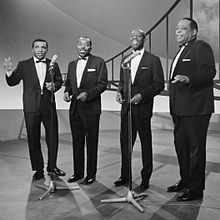Golden Gate Quartet
The Golden Gate Quartet - with changing singers - is one of the best-known and most successful interpreters of gospel music .
history
The Golden Gate Quartet was founded in 1934 in Norfolk, Virginia as the Golden Gate Jubilee Singers ; It has had its current name since 1941.
The group earned its first laurels on the radio program from Columbia (South Carolina) in the 1930s. The national breakthrough came with his participation in John Hammond's famous jazz revue From Spirituals to Swing in 1938 at Carnegie Hall . As a result, the four appeared across the USA on the radio program and in the Café Society jazz club . When they worked on the musical accompaniment of President Roosevelt's inauguration in 1941 , they were the first black music group allowed to perform in Washington's Constitution Hall . In the same year she released her first record and went on the first international tour, which took her to Mexico .
The group's popularity continued unabated during World War II , including war songs like Stalin Wasn't Stalling . During this time she also appeared in several Hollywood films , such as Star Spangled Rhythm , Hit Parade of 1943 and Hollywood Canteen .
After the war, the Golden Gate Quartet could not maintain its outstanding position in the field of gospel, but had to share its fame with new groups such as The Soul Stirrers , which sometimes better suited the changing tastes of the time. Not least because of this, the quartet largely turned away from the USA and went on numerous international tours. a. to Canada , several European countries , the Middle East and Japan . There it sometimes appeared together with stars from the host countries, such as Gilbert Bécaud , Jacques Brel or Heino , with whom the quartet Schwarzbraun ist die Hazelnut sang in German. On this occasion, the quartet appeared as guests of honor on Heino's preliminary farewell tour in 2005. In 1981 the Golden Gate Quartet played in front of 2,500 people in the Basilica of Lourdes - another 20,000 had not been allowed to enter. In 1990 in Bordeaux it was even possible to assemble an auditorium of 100,000 people. It was not until 1994 that the group performed for the first time in their native USA.
plant
The Golden Gate Quartet has a broad stylistic spectrum, from Owen's melancholy style in pieces like Anyhow or Hush, Somebody's Calling My Name to highly syncopated arrangements like Shadrach , Meshach and Abendigo . Often they also worked with special voice effects, with which they imitated train noises in songs such as Golden Gate Gospel Train . Langford's lead vocals, which alternated between baritone and falsetto , often contrasted with Johnson's syncopation, which was to become the group's trademark.
The Golden Gate Quartet's most successful gospels include: a. Swing Low, Sweet Chariot , Joshua Fit the Battle of Jericho , Ezekiel Saw the Wheel , Go down Moses , When the Saints Go Marching In , Nobody Knows the Trouble I've Seen and Rock My Soul . From the field of secular songs, On the Sunny Side of the Street and If I Had a Hammer are mentioned.
Members
Founding members were the students AC "Eddie" Griffin, Robert "Peg" Ford, Henry Owens and Willie Johnson . The group, which has had its current name since 1941 and is still active today, is characterized by a considerable degree of staff fluctuation: Griffin and Ford were replaced by William Langford and Orlandus Wilson in 1935, and Langford by Clyde Riddick in 1938 . In 1948 Johnson moved to The Jubalaires , Owen eventually left the group to become a preacher and solo artist. But also in the following period there were always replacements, as individual band members switched to other groups, retired for reasons of age or died. Today the quartet consists of Paul Brembly (baritone), Clyde Wright (tenor), Frank Davis (tenor) and Anthony Gordon (bass).
The group Orlandus Wilson, who belonged to the Golden Gate Quartet from 1935 to 1998 as bassist, manager and arranger, had a particular impact. "Golden Gate Gospel Train" was included on The Wire's 100 Records That Set The World On Fire (While No One Was Listening) .
The very first experimental formation, still known as the Golden Gate Jubilee Singers in 1932, consisted of Eddie Griffin (bass), Willie Johnson (baritone, moderator), Henry Owens (2nd tenor and vocal all-rounder) and Clyde Riddick (1st tenor). It was not until 1934 that the ensemble was formed as Orlandus Wilson (bass), Willie Johnson (baritone), Henry Owens (2nd tenor) and William Langford (1st tenor). The singer and stage comedian Clyde Riddick, who died on October 9, 1999 in Cologne, then got a permanent place from 1939 to 1995.
literature
- Jay Warner: The Billboard Book Of American Singing Groups. A History 1940–1990 . Billboard Books, New York 1992, ISBN 0-8230-8264-4 , pp. 35-37.
